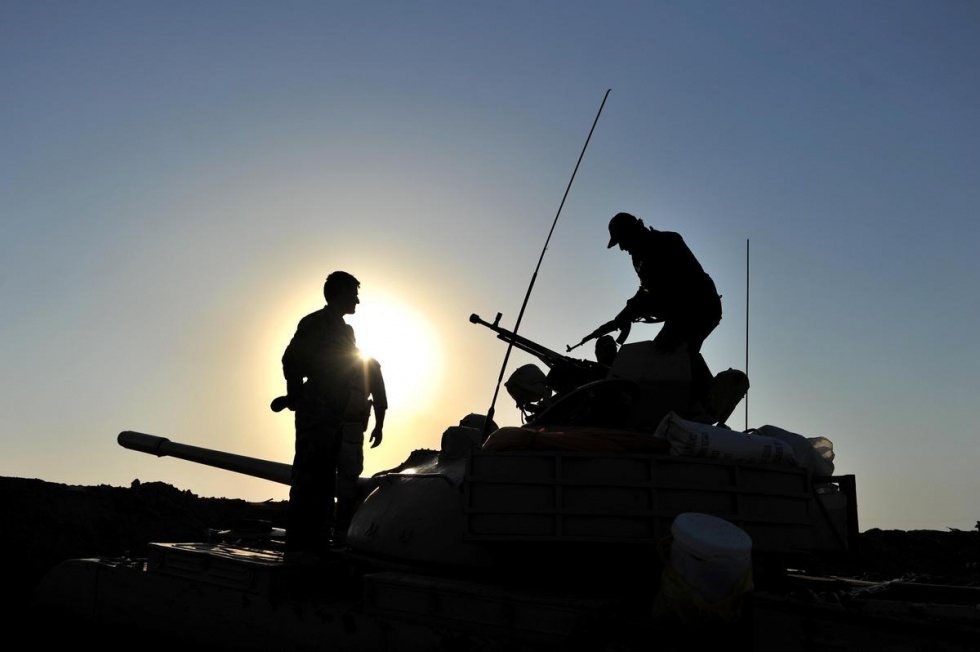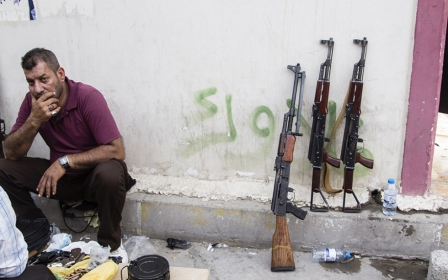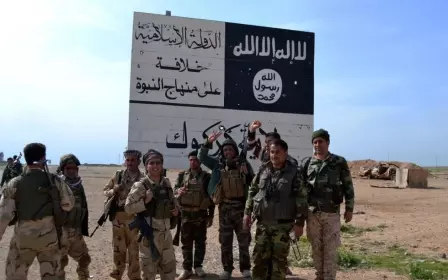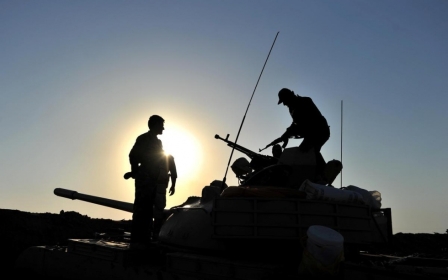Kurds, Baghdad scuffle for control of oil-rich Kirkuk

KIRKUK, Iraq - The Iraqi government summoned Kirkuk’s police chiefs to Baghdad for investigation after Kirkuk’s Kurdish Governor Najmaldin Karim sacked the local Iraqi intelligence head, Brigadier General Orhan Khalil, whose unit was accused of killing civilians.
A dispute erupted between the Shia-controlled interior ministry in Baghdad and the Kurdish governor this month over who is in charge of the security forces in the province of Kirkuk following a clash between Iraqi intelligence forces led by Shia Turkmen and Kurdish civilians in Kirkuk.
Although officially the Iraqi police controls inner Kirkuk, in reality the police force is Kurdish-led and additionally the efficient Kurdish internal security force, known as Asayish, operates in the city. Meanwhile, the Peshmerga and a small group of Shia militias fight IS on the outskirts of Kirkuk.
On 3 September, a clash erupted between Iraqi intelligence forces and Kurdish civilians in the Hay al-Askari district in Kirkuk. A civilian was killed.
“Three young men kidnapped one of our staff and the intelligence forces came to help him,” Khalil, the Shia-Turkmen head of Iraqi intelligence, told Middle East Eye.
“One of the intelligence members called his friend saying that there were some terrorists and they want to kill him. After this the intelligence forces went and fired on a person. After the investigation we found out there were no terrorists, and that the person who was killed was a civilian,” Halkawt Abdullah Aziz, the head of Patriotic Union of Kurdistan (PUK) security police in Kirkuk told MEE.
According to a statement released by the Kirkuk governor, the civilian was killed when intelligence forces intervened in a small fight. Furthermore, the Kirkuk governor accused the police intelligence of torturing a civilian and forcing him to confess to being a part of a “terrorist group”.
“After that the civilians sued the intelligence officer and the governor who is the head of the security council asked the police intelligence chief to hand over the killers. But they refused,” said Mam Ghafur, the deputy head of the PUK in Kirkuk.
Officers under investigation
Following the refusal, the governor who leads the security council of Kirkuk replaced the head of intelligence after Iraqi intelligence head Khalil did not take any action for three days. The Kirkuk governor also ordered the police checkpoints to arrest the intelligence chief in order to prevent him from fleeing to Baghdad.
Moreover, 11 members of the Iraq intelligence service were arrested and placed under investigation.
“This decision is an injustice. We are here in our position not to kill people but to protect people’s rights,” Khalil told MEE. He confirmed that several of his staff were arrested by Asayish.
After this the Iraqi interior ministry summoned deputy police head Torhan Abdullah, Kirkuk police director Jamal Tahir, and Daquq police head Kawa Gharib, to Baghdad.
“This behaviour by the Ministry of Interior is disrespectful to the people of Kirkuk and we will not accept this,” the Kirkuk governor said in a statement praising the leadership of the Kirkuk police and their coordination with the Kurdish Peshmerga and Asayish forces to make Kirkuk safe.
“It’s a testimony to the people of Kirkuk, that they have not allowed the Daesh [IS] gangs to enter Kirkuk,” the governor statement said.
Eventually all of the police returned to Kirkuk on 14 September, reported Kirkuk Now.
“Najmaldin [the Kirkuk governor] is a strong proponent of the governorate's rights to coordinate security operations as intended in the provincial powers legislation,” Michael Knights, an analyst at the Washington Institute for Near East Policy, told MEE.
“Kirkuk is probably the leading province in Iraq in terms of commanding its own security forces. This naturally causes tensions with both Baghdad and the Kurdish leadership,” he added.
Kurdish power play?
Local Turkmen and Arabs fear the move is another attempt by the Kurds to assert control over Kirkuk’s institutions.
Last October, Arabs and Turkmen protested at the opening of an office of the Kurdish government in Kirkuk. Many Kurds oppose the appointment of a Shia Turkmen by Baghdad as the head of the state-run North Oil Company (NOC) in Kirkuk, which is seen as close to Shia militias.
“The Kurds want to control all the headquarters in Kirkuk. The last remaining ones are intelligence, education and the NOC,” said Mohammed, a Sunni Arab, who uses a pseudonym for security reasons.
On 4 May, armed Kurdish students forced the Baghdad-appointed head of Kirkuk University, Dr Abbas Taqi, to sign a letter of resignation. “The Kirkuk University is now under full control of them [the Kurds],” he said.
Ahmed, a Turkmen, who refused to be further identified, told MEE that some of the Turkmen feel unsafe after Kurds increased their control.
“We feel no confidence, especially after the Peshmerga control of the city, and we know full well they will turn Kirkuk after a period of time into a fully Kurdish city. The Kurds also did this before to Erbil [the capital of the Kurdistan region of Iraq] in the 1990s,” Ahmed said.
He complained that the Kirkuk Kurdish police head Jamal Tahir was not dismissed by the governor, despite the prison escape of 19 al-Qaeda members in March 2012, and an al-Qaeda attack in December 2013 on an intelligence building that killed at least 11 people, in addition to having over 10 people held hostage in the Jawahir mall.
“The governor did not sack him for this, but when the Turkmen intelligence director makes one mistake, he is dismissed,” Ahmed added.
Intelligence chief Khalil told MEE that so far Baghdad has not replaced him, but he cannot enter the Iraqi police intelligence building that is under full control of the Kurdish Asayish.
Kurdish leaders say that they will never hand over Kirkuk to Baghdad’s control since Kurdish fighters have secured the area themselves.
“The disputed territories are all in safe hands now,” said Sirwan Barzani, the general commander of the Kurdish Peshmerga forces on the Makhmour-Gwer frontline.
“These areas are safer now, so why give it back to them?” he said. “If they want a referendum by the constitution [on the future of Kirkuk], they are welcome. If not, we are there,” he told Middle East Eye.
'Tensions will pass'
Kirkuk’s citizens were supposed to vote before 2007 on whether the city should become part of Iraqi Kurdistan, according to article 140 of the Iraqi constitution. However, the referendum was never held and article 140 expired after not reaching its deadline of December 2007. As a result, tensions continued between Baghdad and Erbil over the province.
Despite tensions, analyst Knights says the problems between Baghdad and Kirkuk Kurds will not likely get worse.
“This specific problem will pass and not escalate greatly. But it is a symptom of growing Baghdad and governorate tensile. Over all sorts of appointments - in the university, the NOC, and in the security forces,” Knights said.
Torhan Abdulrahman, the Turkmen deputy police head of Kirkuk, told MEE that the problem would soon be solved. “We have sent three names to Baghdad in order to replace him [Orhan],” he said.
However, Abdulrahman doubted that this would result in more problems between the Kurds and Baghdad. “We have now one common enemy now which is IS, so I don’t think this will be a problem.”
Middle East Eye propose une couverture et une analyse indépendantes et incomparables du Moyen-Orient, de l’Afrique du Nord et d’autres régions du monde. Pour en savoir plus sur la reprise de ce contenu et les frais qui s’appliquent, veuillez remplir ce formulaire [en anglais]. Pour en savoir plus sur MEE, cliquez ici [en anglais].




